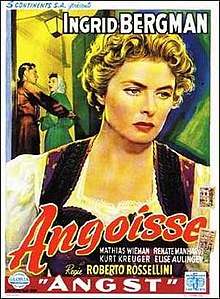Fear (1954 film)
Fear (Italian: La Paura) is a 1954 German-Italian drama film directed by Roberto Rossellini and starring his wife Ingrid Bergman. It has also been released as Angst in the English-speaking world. It is loosely based on the Stefan Zweig novel Fear. It was filmed in Munich and was shot simultaneously in German and English. Rossellini created it because he wanted to explore the reconstruction of Germany from both a material and moral standpoint ten years after making his previous German film Germany, Year Zero.[1] The film is noirish with aspects reminiscent of Hitchcock and German Expressionism.
| Fear | |
|---|---|
 Belgian theatrical release poster | |
| Directed by | Roberto Rossellini |
| Produced by | Herman Millakowsky |
| Written by | Roberto Rossellini Sergio Amidei Franz von Treuberg |
| Based on | Fear by Stefan Zweig |
| Starring | Ingrid Bergman Mathias Wieman Renate Mannhardt Kurt Kreuger |
| Music by | Renzo Rossellini |
| Cinematography | Carlo Carlini Heinz Schnackertz |
| Edited by | Jolanda Benvenuti Walter Boos |
| Distributed by | Minerva Film |
Release date |
|
Running time | 83 minutes |
| Country | West Germany Italy |
| Language | German English |
Plot
Irene Wagner (Bergman), the wife of prominent German scientist Professor Albert Wagner (Wieman), had been having an affair with Erich Baumann (Kreuger). She does not disclose this to her husband, hoping to preserve his innocence and their "perfect marriage". This fills her with anxiety and guilt. However, Johann Schultze (Mannhardt), Erich's jealous ex-girlfriend, learns about the affair and begins to blackmail Irene, turning Irene's psychological torture into a harsh reality. When Irene finds out that the extortion plot is truly an experiment in fear, she is driven into a homicidal/suicidal rage. But she is saved from suicide by her husband at the last minute, both sorry for what they did.
Cast
- Ingrid Bergman as Irene Wagner
- Mathias Wieman as Professor Albert Wagner
- Renate Mannhardt as Luisa Vidor, alias Johann Schultze
- Kurt Kreuger as Erich Baumann
- Elise Aulinger as Haushaelterin
- Edith Schultze-Westrum
- Steffi Stroux (credited as Steffi Struck)
- Annelore Wied
- Klaus Kinski as Cabaret Performer
Reception
The film did not do well when it was released in Italy and Germany. Consequently, the Italian distributor edited the film and re-released it as Non credo più all'amore. In this edited version, a fishing scene is shortened and an explanatory narration is added to two silent scenes. In addition, the ending was changed from a scene showing Bergman attempting suicide to a scene showing her family in the countryside, after Bergman had left her husband, living on for the sake of her children.
The Rossellini Project
This initiative involves 10 films by Roberto Rossellini that are being digitally restored and will then be promoted internationally. Carrying out the restoration work are Cinecittà Luce-Filmitalia, the Cineteca di Bologna, the Centro Sperimentale di Cinematografia, and the Coproduction Office. Fear is one of the ten films being restored. The others are: Rome, Open City (Roma città aperta), Paisan (Paisà), Germany Year Zero (Germania anno zero), L’amore, Stromboli (Stromboli terra di Dio), The Machine that Kills Bad People (La Macchina ammazzacattivi), Journey to Italy (Viaggio in Italia), India: Matri Bhumi, and Interview with Salvador Allende (Intervista a Salvador Allende: La forza e la ragione). [2]
Turner Classic Movies (TCM) North American TV Premiere
On March 15, 2013, Turner Classic Movies broadcast Fear for the first time on TV in North America. [3]
Footnotes
- "Film Exhibitions: 2006: Roberto Rossellini". The Museum of Modern Art. Retrieved 2008-05-04.
- "The Rossellini Project". Coproduction Office. Retrieved 2013-02-14.
- "Fear Broadcast Information for TCM". Turner Classic Movies. Retrieved 2013-02-14.
External links
- La Paura on IMDb
- La Paura at AllMovie
- 1979 New York Times film review by Vincent Canby
- The Rossellini Project
- Cannes Festival Information about the Rossellini Project
- Treasures from the Harvard Film Archive - Harvard University Film Archive screened Fear on July 21 and 23, 2005 as part of its summer exhibition of films. Read a brief synopsis of the film at this site.
- Cinema of the World - Review of Fear that also includes movie stills.
- Dennis Grunes Review of Fear.